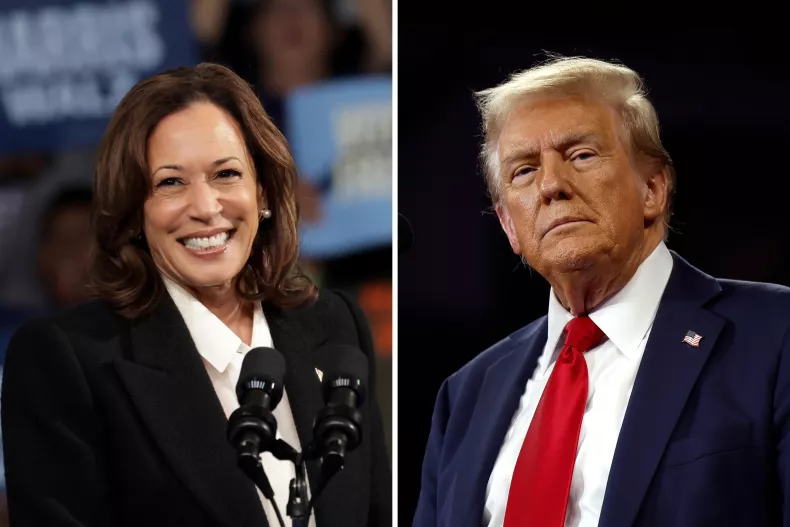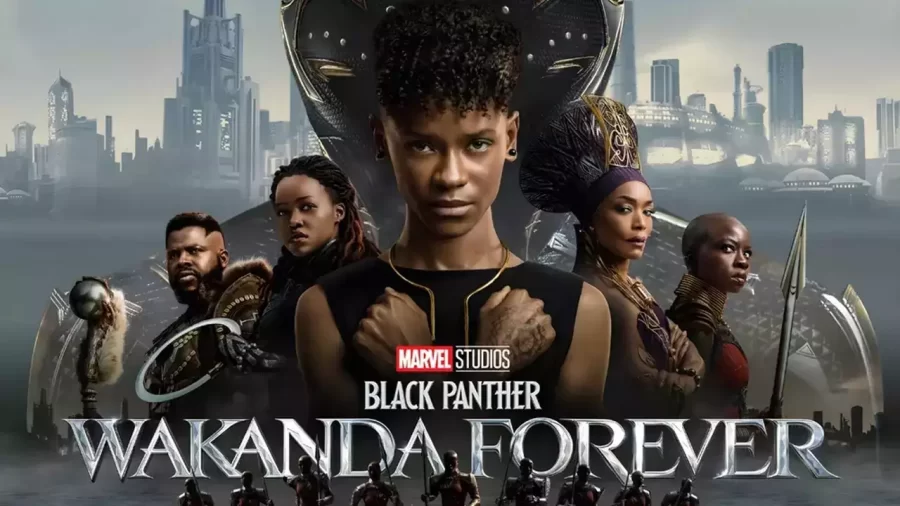“Black Panther: Wakanda Forever” Defies Expectations
February 2, 2023
Like many viewers, I walked into Black Panther: Wakanda Forever as a skeptic. Marvel fans worldwide had grown attached to Chadwick Boseman, whose performance as the titular character King T’Challa, the Black Panther, quickly won viewers over with its earnestness. This unbridled sincerity was a rarity in the often quippy and sarcastic Marvel Cinematic Universe. Tragically, Chadwick Boseman passed away in 2020. As fans grieved, one question lingered in their minds. What would become of the sequel to the 2018 hit?
First announced in 2019 at San Diego Comic-Con, the Black Panther sequel was originally going to take place directly after the events of Avengers: Endgame and continue the story of T’Challah. After Boseman’s passing in 2020, the film underwent significant rewrites. In the coming months, it was revealed to be titled Wakanda Forever, with a majority of the previous film’s main cast returning. Disney also announced that the character of T’Challa would not be recast. Instead, Wakanda Forever would focus on the ensemble cast of the first movie in the wake of the sudden passing of King T’Challa. All of this left many skeptical. Could the ensemble cast of the first movie really carry a film all by themselves, or would they be stuck in the shadow of Boseman? I went into the theater pessimistic but, by the end, was really impressed.
Wakanda Forever follows the tech-savvy Princess Shuri (played by Letita Wright) and once again takes place in the fictional African country of Wakanda, which, after the first movie, revealed itself to the world and is now facing increasing pressure from different nations to share its supply of the rare metal Vibranium. In the first movie, I found Shuri funny, but she never really got a chance to be much more than that. This film really takes the time to explore her as a character as she deals with the loss of her brother. While her trademark confidence and intelligence are at play, the film also greatly deepens her persona as it explores her fear of failure and sense that she was responsible for her brother’s death because she couldn’t cure him of his disease in time. Having Shuri be a bit more jaded and hurt in this film allows the audience to better sympathize with her as they grieve the loss of T’Challa together.
Also returning are Wakandan Queen Ramonda (Angela Bassett), headstrong warrior M’Baku (Winston Duke), spy Nakia (Lupita Nyong’o), Dora Milaje (Wakanda’s all-woman militia) leader Okoye (Danai Gurira), and American agent Everett Ross (Martin Freeman). Almost each of them feels important to the overall narrative of the movie, though I would’ve liked to see more of Okoye. The weakest part of the film are the scenes featuring Ross. They feel disconnected from the main plot and, like the first movie, Freeman’s character just isn’t very charismatic or interesting. His parts mainly feel like filler to set up some future conflict, and I was much more interested in returning to the colorful and vibrant Wakanda than staying in a drab American city.
For me, however, the personal highlights of the film were the newcomers. Dominique Thorne joins the cast as Riri Williams, a young American inventor. Riri invented a vibranium detector, which was used by the US government to discover an off-shore deposit of the rare metal (initially believed to be only found in Wakanda). This deposit is actually claimed by the people of the underwater city Talokan, another new element in the movie. Throughout the film, the people of Talokan hunt Williams down since her invention revealed their existence to the outside world. Williams acts as an intellectual rival to Shuri and is more compelling as an “outsider” to Wakandan society than Ross. Her relentless energy rubs off on the rest of the cast as she is just as wowed by Wakandan technology as the viewers are. Thorne stands out as a much needed shot in the arm of a stagnating MCU, and I’m excited to see more of her in her own upcoming show Ironheart.
Additionally, Tenoch Huerta steals the show as Namor, is the leader of Talokan, whose underwater people face destruction following the discovery of vibranium by the Americans. They act as the main antagonists of the film but are very easy to empathize with, as Killmonger was in the first movie. Huerta’s performance is electric and filled with a level of raw emotion not often seen in the MCU. He’s at once threatening and charismatic as he guides viewers through the magical underwater world he rules over. Though I won’t spoil his backstory (it’s worth experiencing firsthand), it brilliantly intertwines themes of imperialism and colonialism to create something I found very compelling. Namor is easily, in my eyes, the best part of the movie, and is a reminder that a great villain has the power to elevate any superhero story to much greater heights.
Black Panther: Wakanda Forever doesn’t just forget about Boseman, however. In fact, the whole film feels like a dedication to him. Each returning character’s personal plotline revolves around their relationship to the former king. Nakia hides in Haiti after the loss of her husband as Ramonda struggles to rule with the same diplomatic precision as her son, all while ruling a country without a Black Panther. Shuri is crippled with regret as she was unable to find a cure for her brother’s disease. Murals of the late king cover the streets of Wakanda as his presence still looms over the nation and the world. Forever is as much a movie about T’Challa as it is about anyone else. The hole created by his loss informs each aspect of the story. The movie also is not afraid to cut back to clips from the first film and remind the audience what this sequel is missing. It’s not afraid to entertain the idea that there may not be a future for the Black Panther without Boseman. It never rushes to forget him or move past him. Instead, the movie takes its time in honoring and celebrating his legacy.
The sequel features the same level of grand spectacle as its predecessor and other Marvel movies before it, but it is also able to do something many other Marvel movies have not been able to — be quiet. It is these solemn moments that define Wakanda Forever. Though the runtime could have been cut down to include less set up for future movies, Wakanda Forever hit the rare mark that the first film did. It is a grand superhero spectacle, but where the overall story and message of its contemporaries ring hollow, Wakanda Forever features a level of heart and sincerity that separates it from the pack. In choosing not to forget T’Challa and keeping his memory alive throughout the film, Black Panther: Wakanda Forever both effectively honors the memory of Boseman while expanding on the themes of imperialism and colonization present in the first film.


















